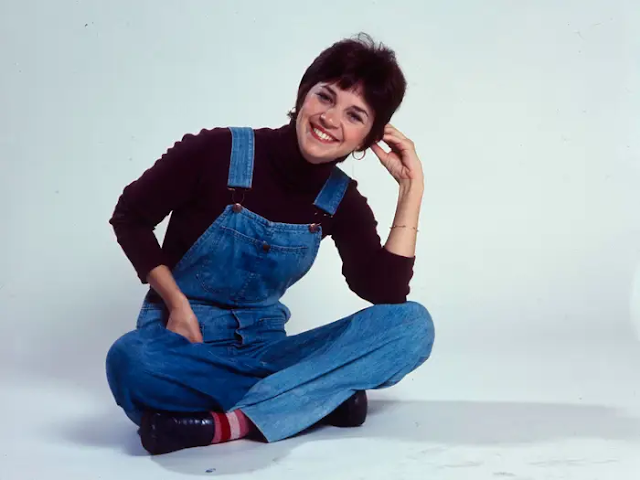 "Child's Play"
"Child's Play"May 26, 1981
C+
In this story Jeff Franklin wrote with Dana Olsen (who would do one more L & S script), Shirley has another chance to put on a show for children, but this time it's not Alice in Wonderland but something she's written herself, Murder in Mother Goose Land. She again recruits all of her friends to perform (this time including Rhonda), and we see more of the play, with different members of the cast, due to Squiggy's inability to follow directions (street as well as stage). The episode isn't especially funny, although we're probably meant to take the line about the girls being willing to look like idiots with no regard for taste, and therefore perfect for television, as a wink at critics of L & S.
After the Lavenny fest of the preceding episode, there honestly isn't much here, other than them building a card-house together and sitting next to each other on a very crowded couch. We do get a Lavley (Shirerne?) kiss, although it's pretty ambiguous. When the girls put on the play as a two-woman show, Shirley is the Prince who must awaken Sleeping Beauty. Laverne objects and Shirley says something like, "I won't force myself on you." But then she does kiss Laverne, who says, "Not bad," but also warns Shirley to never do that again.
John Miranda, who plays the nameless Man in Restaurant, would be a Minister the next year. Gary Menteer would direct the "That's Entertainment" episode, another episode which would obviously focus on a show within a show.
In its sixth season, Laverne & Shirley climbed back to a very respectable #20 in the ratings. (Happy Days was #15, yes, post-Richie, while even the loss of Chrissy Snow couldn't keep Three's Company out of the Top Ten, although it tied for #8 with House Calls.) The move to California may've given this show a boost, although the glory days were definitely past.
I rate Season Six in the narrower range of C+ to B, but it still averages out to B-, like the Milwaukee seasons. There are no classic episodes here, with even the best sixth-season episodes having noticeable flaws. On the other hand, there are no really weak episodes either. The series delivers, and it certainly can't be accused of being stale this season. Quite the opposite.
 What was going on that season? Off-screen, you had two leads who really didn't want their characters (and all the other characters) to move to California. One lead was in the middle of a divorce, which must've been stressful, although what we see onscreen is Penny Marshall (especially once her regular romantic lead got a case of the Hill Street Blues) suddenly flirting madly, even when the script doesn't call for it, with a very obliging Michael McKean. Cindy Williams's personal life wasn't yet impacting Shirley, although her marriage to Bill Hudson the following year would change the series forever.
What was going on that season? Off-screen, you had two leads who really didn't want their characters (and all the other characters) to move to California. One lead was in the middle of a divorce, which must've been stressful, although what we see onscreen is Penny Marshall (especially once her regular romantic lead got a case of the Hill Street Blues) suddenly flirting madly, even when the script doesn't call for it, with a very obliging Michael McKean. Cindy Williams's personal life wasn't yet impacting Shirley, although her marriage to Bill Hudson the following year would change the series forever.And the scripts were all over the place, not with the controlled wackiness of the Milwaukee seasons, although the physical stunts and slapstick were as strong as ever, but with twists that made plots like Shirley thinking she's a stripper seem standard. The girls get a job as stuntwomen, and yet Laverne doesn't like her stuntman boyfriend doing his job, but it doesn't matter anyway because he'll disappear without explanation, including how Carmine is paying the rent on his own. (Maybe he has savings from selling his dance studio.) Shirley meets a man whose ex-wife looks like her. Lenny is a sex fiend who tries to attack Laverne in a hotel room, but he's also a shy, sweet guy who doesn't know how to woo a waitress. Sgt. Plout can show up and become a lounge singer, and half the regular characters can unknowingly ingest marijuana. And everyone can tear each other apart in a game of Truth (while the offscreen fights on this series had long upset the Happy Days cast), and then be upset when Carmine tries to be the Don Rickles of his generation.
Most bizarrely, not only can we jump ahead two or three years, but that friggin' calendar in the kitchen always stays on November 1965 and no one can measure time accurately anymore, even when it involves a wedding anniversary, and a date-- when Frank & Edna met-- that Carmine should know, since it happened back when he thought he was in love with Laverne.
Early adolescence was confusing enough, so I don't know if I even tried to make sense of Season Six at the time. As for Season Seven, well, I'll start trying to figure that out next week....


No comments:
Post a Comment